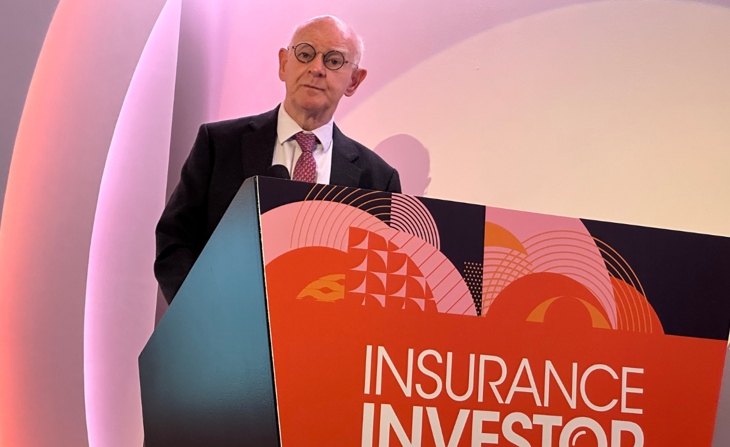
The UK’s stagnant economic outlook is concerning for the nation’s long term future – but, in the short term, the situation could be much worse. Meanwhile, investors should focus on local infrastructure and new areas for innovation, such as Artificial Intelligence (AI) and digitalisation.
These sentiments came from Sir Howard Davies, Chairperson of NatWest Group, speaking at the annual Insurance Investor Live | Europe 2023 event, held today in London.
Davies was speaking broadly on the topic of how to prompt economic growth in a post-Covid world – examining, more specifically, the function of monetary and fiscal policy, as well as the role of regulatory oversight.
“If you try to summarise where we are in this post-Covid recovery period, it would be something like this,” he said, before offering a diagnosis: “The global economic recovery is losing momentum, and the harsh reality of rising interest rates is taking its toll. The consensus includes loud voices arguing that there will be an outright recession.”
However, added Davies, “that’s not where I am”. He continued, describing the state of the ‘flatlining’ trend in neighbouring regions.
“The global economic recovery is losing momentum, and the harsh reality
of rising interest rates is taking its toll.”
Despite the fact that the economic boost due to Covid savings is levelling off – particularly in the US – the likely end of the rate hike cycle there means a period of mediocre growth, he said. “It looks as if we’re in soft landing territory. However, the US is unlikely to be a locomotive for the global economy.”
When it came to predictions about China, Davies said he was seeing a “depressed equity market”. Larger factors, such as workforce issues, were also key to consider – with unemployment, especially for the nation’s youth, up to around 20%. Not to mention the “tricky figures in the property and housing sectors”, which he saw as “no longer pulling the economy along”.
“China looks soft,” he said. “And unlikely to provide the global impetus [we need].”
With the stage set for two world superpowers, Davies turned to the UK – and the role the country could play in global markets. “So, what about Britain?” he asked. “Our relative position, which does now look a bit better, still feels stagnant.”
“We’ve been describing the economy as flat – but not worse than flat.”
He attributed this situation to a variety of factors, one being national output in the health services and manufacturing and construction sectors. “We’ve been describing the economy as flat – but not worse than flat,” he said. “It’s moving gently sideways; it remains intact.”
The most worrisome factor, Davies continued, was the rise in unemployment, which would have a direct effect on mortgage and housing markets. When asked about his future predictions, he mentioned a further slowing. “It seems likely that the interest rate rises we’ve seen will bring about a growth slowdown and further unemployment.”
So what should insurance investment teams expect as macro trends going forward?
Davies said that a further flatlining of inflation could be expected come 2024, with hopefully a bit of a recovery in the latter part of the year. “Any forecast about interest rates can be made to look foolish rather quickly,” he added, referring to the Bank of England’s (BoE) impending decision on what could be a final rate hike.
“Financial sector concessions are leading the pack. Wages are a lagging indicator,” he continued. “My hunch is that there will be a little more tightening to come, but that rates are very close to their peak. I suspect that we may see interest rates wait where they are for a while, to hopefully improve wage growth and unemployment.”
“The UK is relying on overseas investment for income and infrastructure;
our stock market performance has been dismal.”
Asked if there was a deeper, structural decline in UK capital markets at play, Davies expressed hesitation at the amount of overseas investment he saw. “The UK is increasingly relying on overseas investment for income and critical infrastructure,” he said. “Our stock market performance has been dismal.”
He called the situation “capitalism without any UK capital”, and suggested that increased promotion of fintech and other innovative spheres – likely Artificial Intelligence (AI) and tokenisation, for example – was necessary.
Another big focus was the impending Solvency II changes. There had been some imaginative plans to consolidate DC pension schemes, Davies said — though he wasn’t convinced the impact would be significant.
One area he did see as getting a bit of a boon from solvency reforms was long-term infrastructure investment. “The reform is worth doing and will have some impact,” he said.” In general, since the Great Financial Crisis (GFC), our regulators have developed a defensive stance. If one could deregulate or reregulate one’s way to sustainable growth, I suspect we would’ve done so already,” he continued.
“[Solvency] reform is worth doing and will have some impact.”
In his opinion, this meant that the UK needed to focus on becoming a more attractive investment opportunity for both domiciled and non-domiciled investors – especially from a manufacturing, industry, and infrastructure perspective.
Flatlining, whilst keeping the economy from a deep, frightening downfall, was not helping to boost investment appetite – and would need to immediately be remedied for a brighter future for insurance organisations.